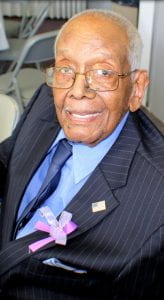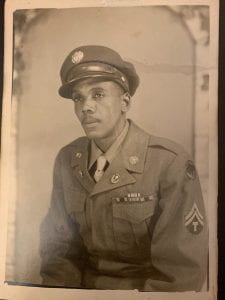Month: December 2019
About this Podcast
This documentary podcast explores the history of Buffalo Soldiers — the Black soldiers that fought in the United States Army before it was desegregated in 1948. The podcast features a special interview with 101-year-old Willie Jenkins, who was drafted into the Army in 1942 and served until the end of World War II.
I was inspired to make this podcast because Willie Jenkins is my great-grandfather, and I want to contribute to the documentation and commemoration of his experience in the armed forces. I also wanted to document his personality and wit, as he has thankfully maintained it even after 101 years of life. This project if my gift to my great-grandfather and those who share this experience with him.
Fading History: Buffalo Soldiers
The term “Buffalo Soldier” refers to the Black Soldiers who fought in United States Army between 1866 and 1948. Created in 1866 by an Act of Congress, the first Black members of the segregated U.S. Army consisted of only six regiments regiments . Over time, the number of Black soldiers in America’s army began to grow, and the men who served in these units became known as Buffalo Soldiers. Buffalo Soldiers remained an important part of the military and provided countless contributions to the development of modern America, including serving as the first Park Rangers in Yosemite, Sequoia, and Yellowstone National Parks. They did all this despite having to fight for a nation that brutalized and disenfranchised their people, and they even faced unchecked racism and discrimination from within the military while they served. The term, “Buffalo Soldier” comes from the Cheyenne people, who compared the texture of the Black soldiers’ hair to the hide of buffalo. The Army stopped using the term in 1948 when the it was desegregated by an executive order from President Harry Truman.
Today, most people know very little about the Buffalo Soldiers. Some scholars are attempting to track and disseminate this history, and in the 21st century the House of Congress has approved funding for a number of monuments commemorating Buffalo Soldiers, but the American public is beginning to forget this difficult history. This podcast and projects like it are an effort to preserve the history and legacy of Buffalo Soldiers.
Willie Jenkins
Willie Jenkins was born in 1918 and raised on a farm just outside of Savannah, Georgia, during the height of Jim Crow racism. He moved to Philadelphia as a young man amongst the many other people like him who participated in the Great Migration, and eventually settled in Philadelphia. In 1942, Willie was drafted into the United States Army which was segregated at the time. He fought in the 92nd Division until the end World War II, and then returned home to Philadelphia, where he worked, married, and raised three children. Today, he resides with his granddaughter and enjoys watching sports, going for long drives around the city, and spending time with his children, grandchildren, and great-grandchildren, and great-great-grandchildren. The photos provided are from 2019 and 1943.
For Further Reading/Research
The Smithsonian has some interesting work on the Buffalo Soldiers available online. A comprehensive guide to the online content and the locations of Smithsonian exhibitions on Buffalo Soldiers can be found here.
Additionally, the U.S. Department of the Interior has some information on Buffalo Soldiers available on its website.
Citations
Bibliography
- Eschner, Kat. “Three Things to Know About the Buffalo Soldiers” . Smithsonian Magazine, 28 Jul 2017. Access 6 Oct 2019.
- Leckie, William H. The Buffalo Soldiers: A Narrative of the Negro Cavalry in the West. [1st ed.]. Norman: University of Oklahoma Press, 1967.
- Hargrove, Hondon B. Buffalo Soldiers in Italy: Black Americans in World War II. Jefferson, N.C.: McFarland, 1985.
- Glasrud, Bruce A. Brothers to the Buffalo Soldiers: Perspectives On the African American Militia and Volunteers, 1865-1917. Columbia: University of Missouri Press, 2011.
- Website of the Legislative Branch was consulted for records on the Buffalo Soldiers Commemoration Acts of 2002, 2003, and 2005.
- The United States Department of the Interior’s online content on Buffalo Soldiers
Music
Song used in podcast: “Buffalo Soldier” by Bob Marley & The Wailers.

